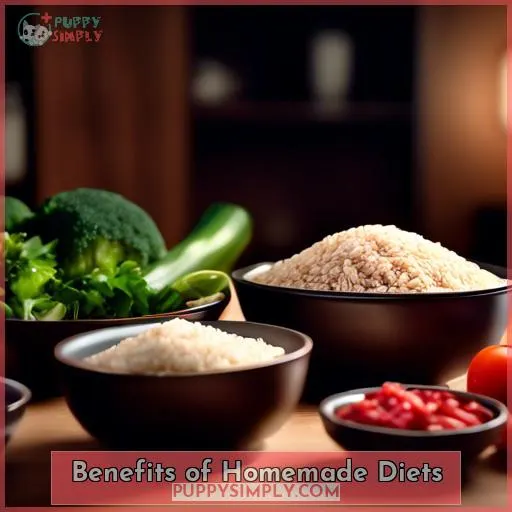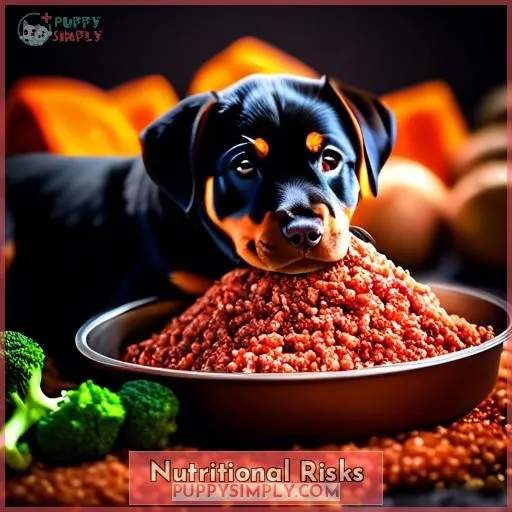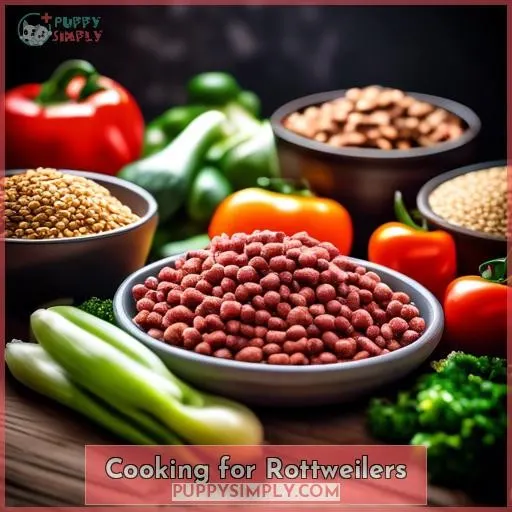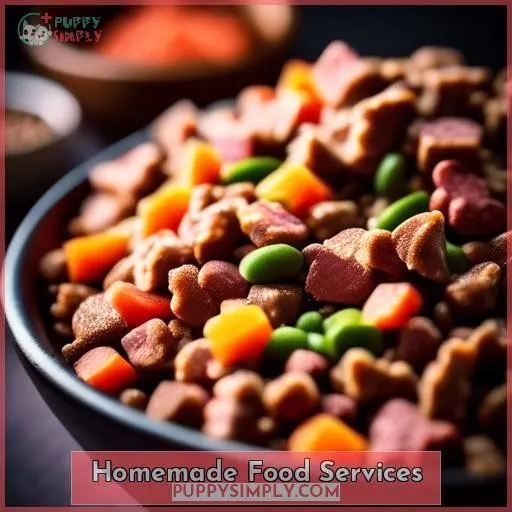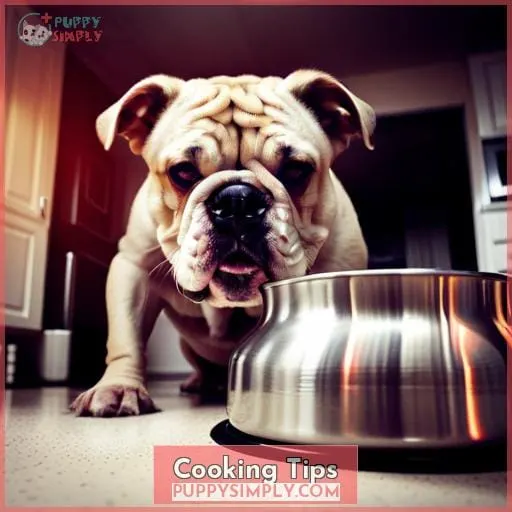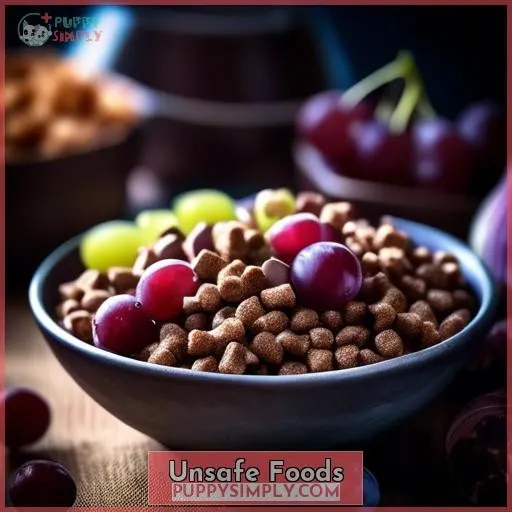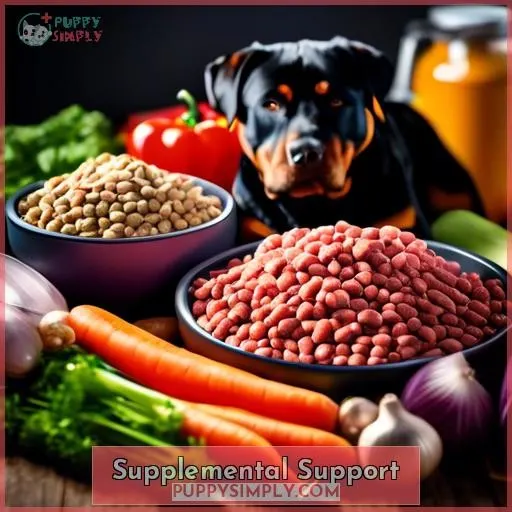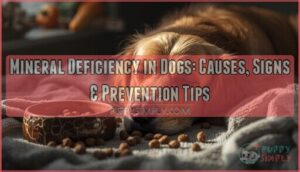This site is supported by our readers. We may earn a commission, at no cost to you, if you purchase through links.
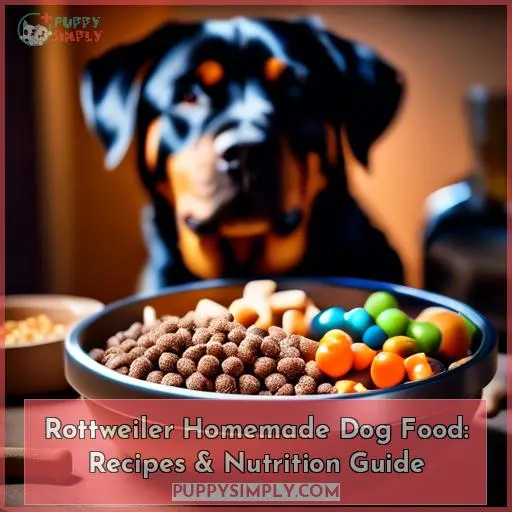
Whether you’re aiming to manage allergies, improve coat condition, or simply bond through mealtime, our Rottweiler homemade dog food recipes and nutrition tips are tailored to meet the unique needs of this robust breed.
Let’s embark on a journey to wholesome, home-prepared meals that will have your Rottie thriving.
Table Of Contents
- Key Takeaways
- Benefits of Homemade Diets
- Nutritional Risks
- Diet Considerations
- Cooking for Rottweilers
- Recommended Recipes
- Homemade Food Services
- Cooking Tips
- Dietary Changes
- Unsafe Foods
- Supplemental Support
- Frequently Asked Questions (FAQs)
- How can I ensure my Rottweiler gets enough calcium in a homemade diet without using bone meal?
- What are the best sources of omega-3 fatty acids for Rottweilers if I prefer not to use fish oil supplements?
- Can I include grains in my Rottweiler’s homemade diet, and if so, which ones are most beneficial?
- How do I determine the correct balance of vitamins and minerals in my Rottweiler’s homemade food?
- Are there any fruits or vegetables that should be completely avoided in a Rottweiler’s homemade diet due to potential health risks?
- Conclusion
Key Takeaways
- Homemade diets for Rottweilers can foster healthier eating habits with meals tailored to the dog’s specific needs, ensuring control over ingredient quality and potentially strengthening the bond between pet and owner.
- Nutritional risks of homemade diets include the possibility of essential nutrient deficiencies or toxicities due to imbalanced meals, highlighting the importance of a nutritionally balanced diet.
- Diet considerations for Rottweilers should include understanding their nutritional needs for overall health, avoiding toxic ingredients, ensuring a balanced diet with essential nutrients, and consulting with a vet for dietary guidance.
- Cooking for Rottweilers requires including essential nutrients for a balanced diet, focusing on high-quality proteins, healthy fats, and select carbohydrates, and adjusting the diet for different life stages.
Benefits of Homemade Diets
Opting for homemade diets for your Rottweiler can foster healthier eating habits and prove to be more cost-effective in the long run. By preparing meals yourself, you gain full control over the quality and source of ingredients, ensuring your furry companion enjoys a variety of fresh, nutritious foods tailored to their specific dietary needs.
This hands-on approach not only strengthens the bond between you and your Rottweiler but also allows for a personalized diet that can address and potentially mitigate breed-specific health issues.
Healthier Eating Habits
By cooking homemade meals for your Rottweiler, you’re taking control over their diet and ensuring they eat healthier.
- Meal Planning: Tailor meals to your Rottweiler’s specific nutritional needs.
- Ingredient Selection: Choose fresh, wholesome ingredients.
- Cooking Techniques: Preserve nutrients through gentle cooking.
- Nutritional Balance: Ensure a balanced diet with all essential nutrients.
- Flavor Variety: Keep meals interesting with diverse flavors.
Cost-Effectiveness
One can seamlessly transition from discussing the health benefits of homemade diets for Rottweilers to their cost-effectiveness. Preparing meals at home can be a more affordable option. By choosing budget-friendly ingredients and employing economical substitutions, you can create nutritious DIY dog food.
These money-saving strategies ensure your Rottweiler receives optimal nutrition without breaking the bank.
Nutritional Risks
When you decide to prepare homemade food for your Rottweiler, it’s crucial to be aware of the nutritional risks involved. Essential nutrient deficiency and the overuse of certain nutrients can have serious health implications for your dog.
It’s important to ensure that the meals you prepare are nutritionally balanced and meet all of your Rottweiler’s dietary needs.
Essential Nutrient Deficiency
Why might your Rottweiler suffer from essential nutrient deficiency when fed a homemade diet? Achieving the right nutrient balance is crucial. Without careful meal planning and ingredient sourcing, your dog might miss out on essential proteins, vitamins, and minerals.
- Inadequate growth and development.
- Compromised immune function.
- Long-term health implications.
Dietary adjustments and a focus on homemade dog food nutrition and safety are vital.
Overuse of Certain Nutrients
While transitioning from commercial to homemade dog food can help avoid deficiencies, you must also be cautious not to include dangerously high levels of certain nutrients in your Rottweiler’s diet.
Overnutrition risks, such as nutrient excess and dietary imbalances, can lead to nutrient toxicity.
Ensuring vet-approved dog food portion sizes is crucial to prevent nutritional oversupply in your Rottweiler’s homemade food diet.
Diet Considerations
Understanding your Rottweiler’s nutritional needs is crucial for their overall health and well-being.
Avoiding toxic ingredients and ensuring a balanced diet with the right mix of proteins, fats, carbohydrates, vitamins, and minerals is essential.
By prioritizing their dietary requirements, you can provide your Rottweiler with homemade meals that cater to their specific nutritional needs.
Understanding Nutritional Needs
Following the discussion on the potential risks of a homemade diet, it’s crucial you’re aware of your Rottweiler’s specific nutritional requirements to avoid deficiencies and ensure a balanced diet.
Understanding puppies’ growth stages is key when crafting homemade dog food recipes.
Include a variety of proteins, fruits, and vegetables to support your Rottweiler’s diet and health, tailoring meals to their unique needs.
Avoiding Toxic Ingredients
In addition to understanding your Rottweiler’s nutritional needs, you’ll need to be vigilant about avoiding toxic ingredients that could harm your pet’s health.
When preparing homemade dog food recipes, be aware of hazardous elements and poisonous components. Your toxicity awareness ensures the safety of your Rottweiler’s diet, whether it’s a raw diet or slow cooker dog food.
Cooking for Rottweilers
When cooking for your Rottweiler, it’s crucial to include all essential nutrients to ensure their diet is balanced and tailored to their specific life stages. You’ll want to focus on high-quality proteins, healthy fats, and a careful selection of carbohydrates, alongside necessary vitamins and minerals.
Always consult with your vet to make sure the meals you prepare meet your dog’s nutritional needs and adjust the diet as they grow from puppyhood to adulthood.
Essential Nutrients Inclusion
Ensuring your Rottweiler receives all six essential nutrients is crucial when you’re cooking their meals at home. A balanced diet, rich in protein, fats, carbohydrates, vitamins, minerals, and water, supports their health and vitality.
Follow dietary guidelines and use a variety of ingredients to meet these needs. Incorporate nutritional analysis in your meal planning, especially for recipes tailored to your Rottweiler’s weight and activity level.
Adjusting for Life Stages
When considering the various life stages of your Rottweiler, it’s crucial to adjust their homemade diet to meet the changing nutritional demands.
Puppies have specific growth requirements, needing more calories and nutrients for development.
Adult maintenance focuses on sustaining health, while senior nutrition may require fewer calories but more joint support.
Life stage adjustments ensure your Rottweiler thrives at every age.
Recommended Recipes
When considering homemade food for your Rottweiler, it’s essential to focus on recipes that meet their nutritional needs while being both delicious and healthy.
The Beef and Brown Rice Dinner and Chicken & Rice Delight are two excellent options that provide a balanced diet rich in proteins, carbohydrates, and essential nutrients.
These meals aren’t only satisfying but also ensure your Rottweiler receives the right amount of energy and nutrition tailored to their size, activity level, and health conditions.
Always consult with your vet to ensure these recipes align with your dog’s specific dietary requirements.
Beef and Brown Rice Dinner
You’ll find that preparing a Beef and Brown Rice Dinner for your Rottweiler is a straightforward process that can provide them with a wholesome and satisfying meal.
Careful ingredient sourcing ensures quality, while cooking techniques like simmering enhance flavors.
Achieving nutritional balance is key, so consider flavor variations to cater to your dog’s preferences.
Proper storage methods will keep meals fresh and safe.
Chicken & Rice Delight
Following the Beef and Brown Rice Dinner, another excellent homemade meal option for your Rottweiler is the Chicken & Rice Delight. This recipe not only caters to the taste preferences of many dogs but also ensures a balanced and nutritious meal.
It’s a particularly good choice if you’re looking for a meal that’s both nourishing and capable of winning over a picky eater.
Homemade Food Services
For those considering homemade food services for their Rottweilers, options like Ollie and Nom Nom provide customized, nutritionally balanced meals tailored to your dog’s specific dietary needs.
- Personalized meal plans that cater to your Rottweiler’s age, weight, and activity level.
- Nutritional consultations with experts to ensure your pet’s diet is complete and balanced.
- Ingredient sourcing from high-quality suppliers, giving you peace of mind about what your dog consumes.
- Cooking workshops and dietary analysis to help you understand the principles of canine nutrition and apply them to your dog’s homemade diet.
These services are designed to simplify the process of feeding your Rottweiler a homemade diet while ensuring they receive all the necessary nutrients for optimal health.
Cooking Tips
When preparing homemade food for your Rottweiler, it’s crucial to focus on recipe adjustments and portion size control.
You’ll want to ensure that each meal is nutritionally balanced, catering to your dog’s specific needs based on their age, weight, and activity level.
Consulting with a veterinarian or a canine nutritionist can provide guidance on the appropriate adjustments to recipes and help determine the right portion sizes to maintain your Rottweiler’s health and vitality.
Recipe Adjustments
When incorporating your dog’s homemade food preferences, it’s crucial to make adjustments to recipes to ensure they’re not only tasty but also nutritionally balanced.
Consider recipe modifications that cater to your Rottweiler’s health needs.
Ingredient substitutions may be necessary for allergies, while nutrient adjustments ensure a well-rounded diet.
Flavor enhancements and texture variations can keep meals exciting and appealing to your dog’s palate.
Portion Size Control
You’ll need to carefully measure your Rottweiler’s meals to ensure they’re getting the right amount of food based on their size, age, and activity level.
- Measuring Techniques: Use a kitchen scale for precise ingredient portions.
- Caloric Requirements: Calculate daily needs to prevent overfeeding.
- Weight Management: Adjust portions for optimal weight.
- Feeding Schedule: Consistent meal times aid in appetite control.
Dietary Changes
When transitioning your Rottweiler to homemade food, it’s crucial to monitor their health closely.
Keep an eye on their energy levels, coat condition, and overall demeanor.
Always consult with your vet to ensure the dietary adjustments meet your dog’s nutritional needs.
Transitioning to Homemade Food
Building on the importance of portion size control and recipe adjustments, it’s essential to transition your Rottweiler to homemade food gradually to monitor their reaction to dietary changes.
Start with small ingredient introductions, ensuring diet adjustments align with their taste preferences.
Transitioning tips include consistent health monitoring to guarantee the new diet maintains your Rottweiler’s well-being and vitality.
Monitoring Health Impact
As you transition your Rottweiler to a homemade diet, it’s crucial to monitor their health closely for any changes. Keep a diligent health tracking log to note shifts in energy, weight, and digestion.
Regular wellness evaluations with your vet can confirm the diet’s efficacy. Through careful dietary monitoring and health assessments, you’ll ensure your Rottweiler’s nutritional needs are met for optimal well-being.
Unsafe Foods
In transitioning from discussing dietary changes to the topic of unsafe foods, it’s crucial you’re aware that certain common human foods can be highly toxic to your Rottweiler and should be strictly avoided to prevent serious health issues.
When preparing homemade meals, food safety is paramount to ensure your pet’s health and happiness.
- Chocolate and Caffeine: These contain theobromine and caffeine, which can be lethal.
- Grapes and Raisins: Even in small amounts, they can cause kidney failure.
- Onions and Garlic: These can lead to anemia by destroying red blood cells.
- Xylitol: Found in sugar-free products, it can trigger a rapid insulin release, leading to hypoglycemia.
Avoid these ingredients to protect your beloved companion from the dangers of ingredient toxicity and poisonous plants.
Supplemental Support
Your Rottweiler’s health can benefit significantly from a homemade diet, but it’s crucial to ensure that their nutritional needs are fully met. Supplemental support is essential when you’re preparing homemade meals for your Rottweiler; without it, your dog may miss out on vital nutrients necessary for their overall health and well-being.
| Supplement Type | Supplemental Benefits | Recommended For |
|---|---|---|
| Salmon Oil | Enhances skin and coat health; supports joint health | All Rottweilers |
| Glucosamine | Promotes joint health and mobility | Senior or active dogs |
| Multivitamins | Nutrient Enhancement for overall health | Dogs of all ages |
| Probiotics | Supports digestive and immune health | Dogs with sensitive stomachs |
| Omega Fatty Acids | Health Support for heart, skin, and coat | Dogs with dry skin or coat issues |
Incorporating these dietary supplements can ensure your Rottweiler receives a balanced diet, enhancing their quality of life and longevity.
Frequently Asked Questions (FAQs)
How can I ensure my Rottweiler gets enough calcium in a homemade diet without using bone meal?
To ensure your Rottweiler gets enough calcium in a homemade diet, include calcium-rich foods like cooked and pureed leafy greens or finely ground eggshells.
What are the best sources of omega-3 fatty acids for Rottweilers if I prefer not to use fish oil supplements?
Excellent sources of omega-3 for your Rottweiler include flaxseeds, chia seeds, and walnuts.
You can also offer cooked, boneless salmon or sardines for a direct animal-based omega-3 boost.
Can I include grains in my Rottweiler’s homemade diet, and if so, which ones are most beneficial?
Yes, you can include grains in your Rottweiler’s homemade diet, and doing so can be beneficial.
They provide essential carbohydrates, fiber, and nutrients, contributing to a balanced diet.
Oats are a great source of carbohydrates, fiber, and nutrients, while brown rice offers vitamins, minerals, and fiber. Both are naturally gluten-free, making them suitable for dogs with gluten intolerance.
However, it’s important to feed these grains in moderation due to their calorie density, to avoid contributing to obesity.
How do I determine the correct balance of vitamins and minerals in my Rottweiler’s homemade food?
To ensure your Rottweiler’s homemade food has the correct balance of vitamins and minerals, consult with a vet or veterinary nutritionist who can tailor a diet to your dog’s specific needs.
Are there any fruits or vegetables that should be completely avoided in a Rottweiler’s homemade diet due to potential health risks?
Avoid grapes, raisins, onions, garlic, and avocados in your Rottweiler’s homemade diet, as these can be toxic and lead to health issues.
Always consult with a vet to ensure safety and nutritional balance.
Conclusion
Embarking on the journey of preparing Rottweiler homemade dog food is like planting a garden; it requires patience and care but yields a bounty of health benefits.
Here’s to your companion’s vitality!

